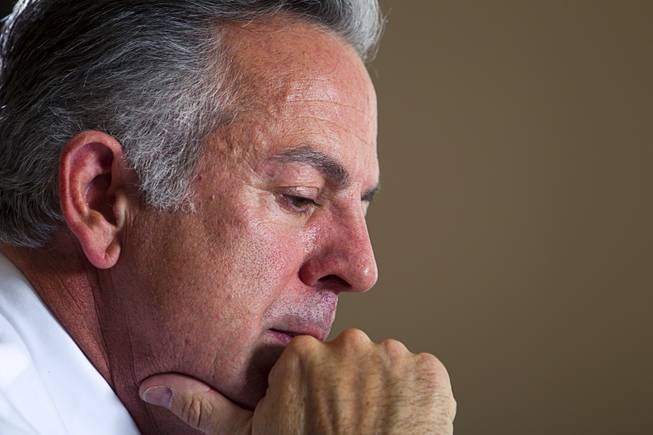
Clark County Sheriff Joe Lombardo considers a question during a meeting with Las Vegas Sun reporters and editors Tuesday, March 24, 2015, at Las Vegas Metro Police headquarters.
Tuesday, Oct. 20, 2015 | 2 a.m.
In response to concerns over a Metro Police detective who posted a racially fueled rant on Facebook last year, the department has adopted a more restrictive social media policy for its officers.
The policy, which Metro quietly adopted in July, significantly expands the department’s ability to punish officers who post controversial messages and content. The three-page policy statement, created in partnership between Metro administrators and community activists after the incident last year, states that violations “will result in the department taking appropriate action up to and including termination.”
The policy also includes specific language that prohibits department members from discriminatory speech on race, ethnicity, sex, sexual orientation, gender identity, disability, political affiliation and other classes.
Todd Raybuck, Metro executive lieutenant, said making the threat of termination an option was a consequential change from previous policy, which merely cautioned members about social media use.
“It put a lot more teeth into it,” he said.
Sheriff Joe Lombardo revealed the changes Monday during an editorial board meeting with the Las Vegas Sun in which several topics were discussed. He said the change was triggered by an incident last year in which detective Bobby Kinch made profane statements on social media, appearing to call for a “race war,” a “revolution” and a “cleansing.” After an internal investigation, Kinch received Metro’s lowest form of discipline, a written reprimand, for violating the social media policy, The Sunday revealed in a story about the investigation in January.
The punishment surprised activists and even many of Kinch's fellow officers, some who felt the veteran detective should have been stripped from some duties or even terminated. But the social media policy at the time, in addition to First Amendment concerns, made a harsher punishment all but impossible.
Kinch said his posts were taken out of context and were not meant to be racist.
After The Sunday story revealed the results of the investigation and internal frustration over the weak reprimand, several community activists raised the issue with the sheriff’s Multi-Cultural Advisory Council, a panel of representatives from local interest groups who meet with the sheriff monthly.
“We then took it and had it placed on the agenda,” said Mujahid Ramadan, the council's chair. “It was a major concern.”
From February to July, a nine-person focus group chaired by Ramadan met four times and largely rewrote the social media policy. Ramadan said Metro wanted the finished product to be stringent.
“They knew they couldn’t have an officer writing something that would damage its credibility,” he said.
Lombardo said the advisory group also wanted a more restrictive policy.
The new policy states that “public employees have qualified First Amendment rights.” “As public employees, speech, on or off-duty, made pursuant to official duties is not protected speech under the First Amendment and may form the basis for discipline if deemed detrimental to the efficiency of operations of the department,” the policy reads.
Although it makes clear that officers have the freedom of expression as private citizens, the new rules emphasize that their freedom to speak on "matters of public concern" is affected if it impairs their duties or the department.
Mark Chaparian, who heads the union for Metro officers, said restrictive policies governing off-duty behavior were effective but could be a drag on morale. He said there was a fine line between an officer’s responsibility and First Amendment rights.
He believes the policy leaves too much interpretation at the discretion of Metro officials and could have a chilling effect on officers’ ability to express emotion. While Lombardo said the union was consulted in the process, Chaparian said he could not recall whether it sent a formal response to Metro as it was devising the new policy.
“If they are responding to a loophole, that’s great,” said Chaparian, executive director of the Las Vegas Police Protective Association. “However, if there’s an individual that violated the policy, deal with that individual instead of punishing or restricting everybody.”
In addition to providing personal social media guidelines, the policy also offers rules for on-duty social media use, saying it can be used constructively for investigations, providing real-time notifications, and community engagement.
“I think (social media) brings out the human side of us,” Lombardo said. “We’re not robots.”

Join the Discussion:
Check this out for a full explanation of our conversion to the LiveFyre commenting system and instructions on how to sign up for an account.
Full comments policy